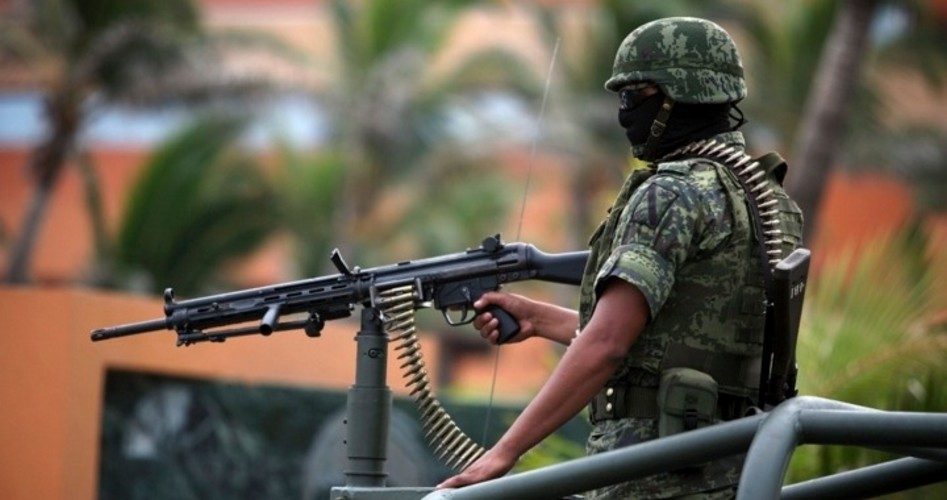
Only weeks after Miguel Angel Treviño Morales became the new head of the infamous Zetas Cartel, reports coming out of Mexico indicate that his brother Omar may have been killed during an hour-long battle between the cartel and Mexican government forces.
As reported for The New American on October 15, Treviño Morales became the leader of the Zetas when Heriberto Lazcano was killed in a battle with Mexican marines on October 7. Both Treviño and Omar Morales have been longtime members of the Zetas, having the respective designations of Z40 and Z42 to designate them as the fortieth and forty-second members of the drug cartel. During their years in the Zetas, Treviño has allegedly earned a reputation for brutality such that even in the world of the cartels, he is described as a “sadist.” This reputation has been a point of pride for his brother Omar; as noted in one press account, “Omar bragged to an informant that Miguel Treviño has personally killed more than 2,000 people, nearly 400 of them U.S. citizens.”
In the aftermath of another battle between Zetas and government forces there were reports that Omar had been killed in the firefight. However, an article translated for BorderlandBeat.com casts doubt on that report, and claims that it was another prominent Zeta, Isaac Aquiahuatl Abel Garcia (aka “King Kong”), who died:
Military sources confirmed Tuesday that Omar Treviño Morales is not dead, however, Isaac Aquiahuatl Abel Garcia, the commander King Kong, was killed in a clash with members of the Navy of Mexico Monday, in the town of Guadalupe, Zacatecas.
It also confirmed that in the fray against the members of the Zetas, there were three members of the Navy killed, after fierce gun battle with heavy weapons and grenades that lasted over an hour on various streets and avenues in the capital of Zacatecas.
Sources indicate that initially, members of the Navy were “unsure” about the identity of one of the of the Zetas killed, said to be a leader, along with six of his companions in the safe house.
They thought they had killed Omar Treviño Morales, brother of Miguel Angel Treviño The Z-40, but after conducting tests and fingerprint identity [of the] crime boss killed, it was confirmed that this is Aquiahuatl Abel Isaac Garcia, “Commander King Kong “.
The unending violence south of these United States has been virtually ignored during this year’s presidential campaign; few Americans outside the border states seem to know — or care — that a conflict on the scale of a civil war is being waged in Mexico. The electorate also seems to be ignorant of the fact that this violence spills over the border on occasion, and that it is the almost insatiable American appetite or illegal drugs which funds the conflict. Writing about the anemic presidential debate over foreign policy, Sara Miller Llana reported for the Christian Science Monitor: “No candidate talked about the drug trade, despite historic violence playing out in Mexico, much of it along the 2,000-mile border that the US shares. They did not talk about energy policy in the Americas. Or the economies of Brazil and Mexico.” And as Jim Wyss wrote for The Miami Herald:
Both parties’ platforms highlight the need to fight drug cartels abroad, but don’t mention U.S. consumption. And they don’t address growing accusations in Latin America that Washington’s drug war has failed and is driving record violence in the region.
“The United States should be providing an energetic and proactive answer to those complaints,” said Bruce Bagley, a professor of international relations at the University of Miami.
But tackling the issue would mean taking on the powerful gun lobby and broaching the subject of treatment programs, or even legalization — both political kryptonite during an election year, wrote Ted Piccone, a senior fellow and deputy director at Brookings.
Latin America is torn by “violent crime, drug trafficking, and guns,” he wrote in Foreign Policy. “The United States is a responsible party on all these issues. We buy the cocaine, methamphetamines, and marijuana that flow across our borders, and we sell the weapons that fuel the traffickers’ gruesome attacks.”
What Wyss neglects to mention is that it was the Obama administration which placed thousands of firearms in the hands of the cartels by means of the ATF’s “Fast and Furious”; furthermore, the “drug lords” who received those weapons were allegedly working for the FBI. If the Mexican people had the free exercise of the right to keep and bear arms, the cartels would find it much more difficult to simply murder them with impunity.
Whether it is ultimately proven that Monday’s battle left Garcia or Morales dead, what is certain is that the war for the future of Mexico will continue, with victory nowhere in sight. And if either presidential candidate has a plan for coping with a war which continues to flow across this nation’s southern border, it is thus far not at the forefront of his campaign.
Photo of Mexican Army soldier: AP Images


